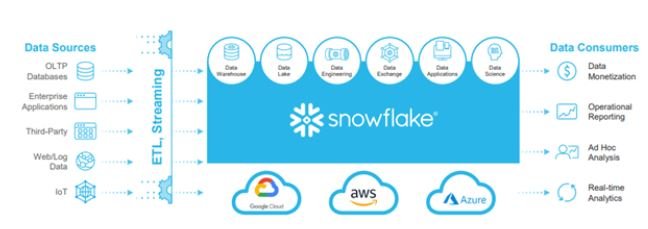What is Snowflake?
Snowflake is a cloud-based data warehousing platform designed to handle large volumes of data for analytics and data management purposes. It operates as a Software-as-a-Service (SaaS) and provides a fully managed solution that is scalable, secure, and highly performant. Snowflake’s unique architecture separates compute and storage, allowing for independent scaling of each, which optimizes both cost and performance.
Key Features:
1. Cloud-Native Architecture
- Multi-Cloud Support: Snowflake runs on major cloud platforms like AWS, Microsoft Azure, and Google Cloud, offering flexibility and choice for deployment.
- Separation of Compute and Storage: Allows independent scaling of resources, optimizing performance and cost-efficiency.
- Elasticity: Automatically scales up and down based on workload demands.
2. Data Sharing and Collaboration
- Secure Data Sharing: Enables sharing of data across different Snowflake accounts without moving or copying data.
- Data Marketplace: Access to a marketplace where users can buy and sell data and data services.
3. Performance and Concurrency
- High Performance: Optimized for fast query performance and can handle concurrent queries without performance degradation.
- Concurrency Control: Supports multiple users and workloads concurrently without resource contention.
4. Data Management
- Support for Structured and Semi-Structured Data: Handles various data types, including JSON, Avro, Parquet, and more.
- Data Cloning: Allows instant cloning of databases, schemas, and tables without additional storage costs.
- Time Travel: Provides the ability to query historical data and perform point-in-time recovery.
5. Security and Governance
- End-to-End Encryption: Data is encrypted at rest and in transit.
- Comprehensive Compliance: Complies with various regulatory standards, including GDPR, HIPAA, and SOC 2.
- Role-Based Access Control: Granular access controls to manage user permissions and data access.
6. Zero Maintenance
- Fully Managed Service: No need for database administration tasks like patching, tuning, or managing infrastructure.
- Automatic Updates: Regular updates and improvements without user intervention.
Benefits:
- Scalability: Seamlessly scale up or down based on data volume and workload.
- Cost Efficiency: Pay only for the compute and storage resources you use.
- Ease of Use: Simplified data management with a user-friendly interface and SQL-based querying.
- Flexibility: Supports integration with a wide range of data integration tools, BI tools, and data lakes.
Use Cases:
- Data Warehousing: Centralized repository for large volumes of structured and semi-structured data.
- Data Lake Integration: Works in conjunction with data lakes for comprehensive data analytics solutions.
- Business Intelligence: Supports various BI and analytics tools for reporting and data visualization.
- Real-Time Analytics: Capable of handling real-time data processing and analytics.
Summary
Snowflake is a versatile, cloud-native data warehousing platform that provides robust, scalable, and efficient solutions for data storage, management, and analytics. Its unique architecture, combined with features like data sharing, security, and zero maintenance, makes it an ideal choice for modern data-driven enterprises looking to leverage the power of the cloud.
![]()




